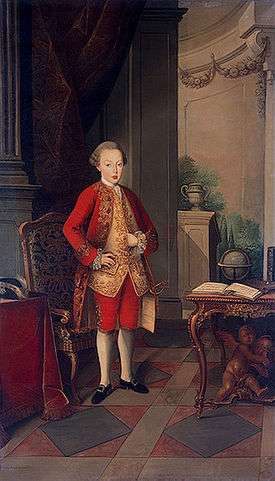José, Prince of Brazil
| Prince José | |||||
|---|---|---|---|---|---|
| Prince of Brazil, Duke of Braganza (more...) | |||||
 José, Prince of Beira, Duke of Barcelos; Miguel António do Amaral, 1773; aged 12. | |||||
| Born |
20 August 1761 Real Barraca, Ajuda, Kingdom of Portugal | ||||
| Died |
11 September 1788 (aged 27) Real Barraca, Ajuda, Portugal | ||||
| Burial | Royal Pantheon of the House of Braganza, Lisbon, Portugal | ||||
| Spouse | Infanta Benedita of Portugal | ||||
| |||||
| House | House of Braganza | ||||
| Father | Pedro III of Portugal | ||||
| Mother | Maria I of Portugal | ||||
| Religion | Roman Catholicism | ||||
D. José, Prince of Brazil, Duke of Braganza (Portuguese pronunciation: [ʒuˈzɛ]; 20 August 1761 – 11 September 1788) was the heir apparent to the Kingdom of Portugal until his death in 1788, as the eldest child of Queen Maria I of Portugal and King Pedro III of Portugal,[lower-alpha 1] members of the House of Braganza
José died of smallpox at the age of 27, causing his younger and ill-prepared brother,[1] Infante João, to become heir-apparent and eventually King. João's reign would be a turbulent one, seeing Napoleonic invasion of Portugal and the loss of the Portuguese Empire's largest and wealthiest colony, Brazil.
Early life

José was born at the Real Barraca where the Palace of Ajuda in Lisbon stands today. He was named after his grandfather who was the ruling King of Portugal at the time of his birth. His grandfather created him Prince of Beira, this being the first time when the title was given to a male.
At the time of his birth, his parents were the Prince and Princess of Brazil, his mother the Heir presumptive of the king.
Marriage
On 21 February 1777, when he was 15 years old, he married his 30-year-old aunt the Infanta Benedita of Portugal. Benedita was an attractive woman and the main candidate for the wife of José. The marriage was the express wish of the dying king, Dom José.
They had no children, however she miscarried twice: in 1781 and in 1786. Three days after their wedding, José's grandfather and Benedita's father the old King José died, and his mother succeeded as queen regnant. Infante José became the new crown prince, being accorded the titles Prince of Brazil and 14th Duke of Braganza.
Death and legacy
| Royal styles of José, Prince of Brazil | |
|---|---|
.png) | |
| Reference style | His Royal Highness |
| Spoken style | Your Royal Highness |
| Alternative style | Sire |
José died at the age of 27 of smallpox. Upon José's death, his younger brother Infante John became heir-apparent to the throne and thus the new Prince of Brazil. José died on the Ajuda Royal Complex in Lisbon. His mother and wife were very badly affected by his death. His wife would be known as the "Dowager Princess of Brazil" till her death in 1829.
José is buried in the Royal Pantheon of the House of Braganza in Lisbon, the resting place for most of the members of the House of Braganza.
Titles, styles, and honours
Titles and styles
- 20 August 1761 – 24 February 1777 His Royal Highness The Prince of Beira, Duke of Barcelos.
- 24 February 1777 – 11 September 1788 His Royal Highness The Prince of Brazil, Duke of Braganza.
Honours
Ancestors
Endnotes
- ↑ When José was born, his parents were not King and Queen yet, but the Prince and Princess of Brazil
Footnotes
- ↑ Chisholm 1911, p. 444.
References
 This article incorporates text from a publication now in the public domain: Chisholm, Hugh, ed. (1911). "John VI". Encyclopædia Britannica. 15 (11th ed.). Cambridge University Press. p. 444.
This article incorporates text from a publication now in the public domain: Chisholm, Hugh, ed. (1911). "John VI". Encyclopædia Britannica. 15 (11th ed.). Cambridge University Press. p. 444.- (Portuguese) A Prince that was almost a King
- (Portuguese) Orders from King José to Prince José
- Carlota Joaquina, Queen of Portugal
External links
![]() Media related to José, Prince of Beira and Brazil at Wikimedia Commons
Media related to José, Prince of Beira and Brazil at Wikimedia Commons
| José, Prince of Brazil Cadet branch of the House of Aviz Born: 20 August 1761 Died: 11 September 1788 | ||
| Portuguese royalty | ||
|---|---|---|
| Preceded by Maria Francisca |
Prince of Beira Duke of Barcelos 20 August 1761— 24 February 1777 |
Succeeded by Maria Teresa |
| Preceded by Maria I |
Prince of Brazil Duke of Braganza 24 February 1777— 11 September 1788 |
Succeeded by John VI |
